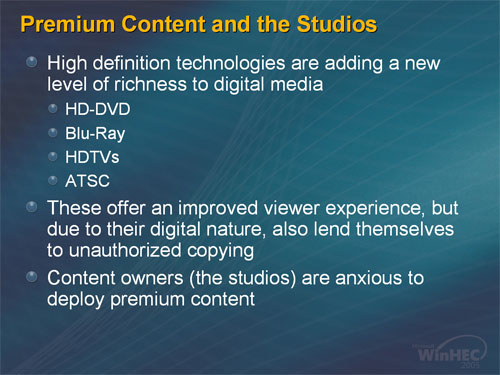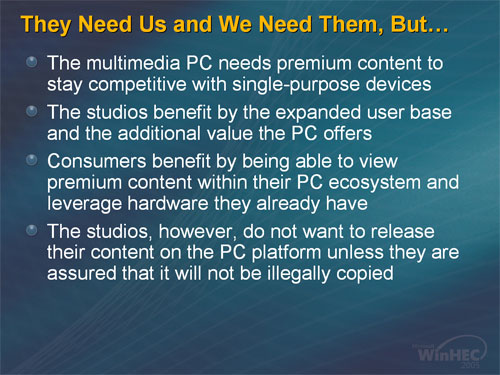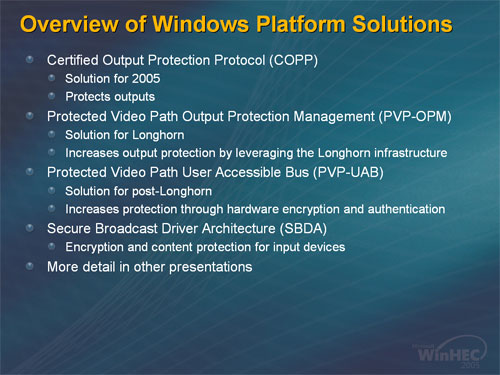WinHEC 2005: Day 2
by Derek Wilson & Jarred Walton on April 27, 2005 8:45 AM EST- Posted in
- Trade Shows
Digital Media Content Protection
In order to gain traction as a home entertainment device, the industry is being forced to support various forms of content protection. ATI gave a presentation on the subject, discussing the costs, benefits, and requirements of content protection. The presentation was certainly one of the more entertaining events so far, if not for the usual reasons. First, let's talk about why we "need" content protection.

The basic reason for protecting content is that new digital versions are enabling the reproduction and distribution of high quality copies. While in the past there was often a degradation of quality by making an analog copy of a movie or song - or a copy of a copy to the nth level - digital content can be reproduced indefinitely with no loss in quality. Since all users are naturally thieves and pirates, no one will ever pay for content again, right? Sarcasm aside, that seems to be the attitude of the content providers. However, due to the large installed user base, it is becoming difficult to ignore the PC as a multimedia platform.

This slide basically summarizes the situation. The content creators want to expand their user base. Meanwhile, the consumers want to be able to use the content which they have purchased as well as any hardware they have in whatever way they see fit. For example, the consumer may wish to place a song they have purchased on a CD for use in a car, or on an MP3 player for jogging. Consumers also want to save money, i.e. buy a single multi-function device like a PC rather than purchasing several single-function devices. These goals are in conflict with each other, unfortunately, and this has been a hot topic of debate over the past several years: consumer fair-use rights vs. copyright holder rights.

As the presentation progressed, ATI discussed the technical solutions that are being developed to ensure that the PC can continue to grow as a multimedia platform. Microsoft is working with vendors to create increasing levels of content protection, which will be rolled out over the coming years. We would say that past experiences such as the breaking of DeCSS - which is a major part of what has brought us to the current stalemate - have created a certain amount of paranoia with the content providers. It's difficult to say whether the above solutions will truly be sufficient, or if they are merely meant as a token effort to combat piracy and lull the content providers into a false sense of security. After all, anything that must eventually be shown in an unencrypted format can be captured at that point; we would say it's simply a matter of time before some of the new encryption schemes are bypassed by the ne'er-do-wells of the world.
The audience reaction to the presentation was decidedly unenthusiastic. The hardware vendors don't seem to like the idea of spending more money on their designs and the consumers don't want to be limited in how they use the products they purchase. Several people approached the microphone to ask critical questions and/or make disparaging comments on the situation, and they were greeted with applause from many of the other attendees. We got the distinct impression that while the hardware vendors were afraid to publicly speak out for fear of being cut off, they would all really prefer to avoid doing extra work which will likely prove futile.
If we take a broad look at the market, TV, movies, and music have been around for decades without real encryption or protection, and yet consumers continue to spend money on them. Fair Use rights such as the ability to make a backup copy or convert a product to a different medium have not yet killed off the content providers. In fact, some would argue that new technologies such as MP3s have only increased the number of people hearing and purchasing content.
There will always be those that try to get something for free where possible, but many people are only looking to pay a reasonable price for a reasonable product. If the RIAA had hurried to create solutions such as iTunes rather than waging a legal war against Napster and the other file-sharing services, they may have saved themselves time and money. Those who fail to learn from the past are condemned to repeat it, unfortunately. For better or for worse, content protection appears to be a large part of the future of digital entertainment.










22 Comments
View All Comments
JarredWalton - Saturday, April 30, 2005 - link
I don't know what people do that causes these supposed crashes all the time. It's not that XP *never* crashes, but it's so rare that I almost always look for hardware problems if it begins to occur frequently. (Well, that and checking drivers, spyware, etc.) I have applications crash as well, but you can't really blame MS for an application bug (unless they wrote the application, of course).NightCrawler - Friday, April 29, 2005 - link
Damn my TV crashed, maybe the blue screen could include a picture of Bill Gates.Anyways here are the steps to enjoying Longhorn:
1. Buy super fast hardware from newegg/zipzoomfly etc.
2. Install Windows 2010 {Longhorn}.
3. Install Crack provided by 12 year old chinese/russian super hacker.
4. Enjoy :)
JarredWalton - Thursday, April 28, 2005 - link
Bill Gates mentioned in the keynote that the cost for a tablet PC is now ~$100 more than that of a standard laptop, and they feel that was critical in getting increased adoption of tablet PCs. Certainly, MS gave no indication that they think tablets are going away, although they didn't say a whole lot about them becoming more popular.Windows CE is still a pretty major business for MS, but I think the focus at this WinHEC was on the launch of XP-64 and the work being done on Longhorn. CE 5.0 is used in many products, and I believe it is the renamed version of PocketPC, right? (I don't follow that market as much, so I may be way off.)
Cygni - Thursday, April 28, 2005 - link
These arent the things that really get the most coverage or press, but i was wondering if there was much or anything on display from the Tablet and PocketPC worlds? I know all the market people seem to think that PocketPC's are on the way out, but i still see a gigantic amount of potential not being tapped. Tablets too... they seem to be dropping off the market instead of growing.Any new stuffs about MS's stance at WinHEC or anything would be enjoyed on this end. Thanks.
Son of a N00b - Thursday, April 28, 2005 - link
i for one, while i can see the future do not like HTPC's, expecially when they are not the best quality (plz correct me if i am wrong, becuase i do not know much abot thme), but i like having a TV and a PC, having them run out of the same box at the same time though wouldnt be to bad, along with house controls, like air conditioning, lights, ect...now that would be cool, yet unpractical until twenty years from now....HTPC's INHO cannot really benefit yet...DerekWilson - Thursday, April 28, 2005 - link
Thanks Pete :-)Pete - Thursday, April 28, 2005 - link
I figure with this nitpick, both of you will be as *wary* of my posts as I'm *weary* of how weak Word's spellcheck is in this era of 2+GHz CPUs.Last paragraph, page two. ;)
Good read, and good points WRT DRM.
sprockkets - Thursday, April 28, 2005 - link
funny but using my new cheap $150 lite on dvd recorder I use the svideo in port and record 1080i shows and it looks good enought for me in 720x480. And using one with a built in hdd is much easier than using a computer to do the same thing, not to mention much smaller and cheaper. Yeah you can do more with a computer, but why have a 200w device doing what my lite on does with 36w?IP over TV? I can see it now. "Sorry, cannot connect to show LOST due to too many users."
"My MCE got hacked, and all the friends I had over saw porn come on the screen during the movie."
I think for these people it's a matter of not making money, it's just I want to release my show when I want where I want. On the consumer side, I want the right to have it now, as in I don't want to wait 8 months for you to release a movie onto personal formats.
oupei - Thursday, April 28, 2005 - link
#13 just like you could use win98 right now? I don't think xp will be an alternative for very long. Linux, on the other hand, might be...man, why does it have to be "home theater IN A BOX"? do you have to make a point to exclude real home theater systems?
Brian23 - Wednesday, April 27, 2005 - link
Don't forget that we can still use XP or Linux if these newfangled operating systems take away our rights.